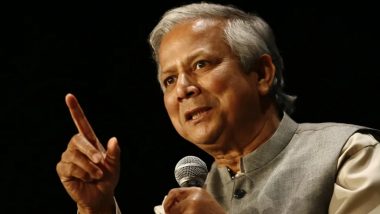Dhaka, August 17: The caretaker government in Bangladesh is committed to ensuring a transition to inclusive and pluralistic democracy and creating an environment in which "free, fair and participatory elections" can be held, its head Mohammad Yunus assured the international community on Saturday. Yunus, the Chief Advisor of the interim government, said while addressing the third Voice of Global South Summit which was hosted by India in a virtual format.
"You all are aware that Bangladesh witnessed a ‘Second Revolution' on 5th August 2024, through a mass uprising spearheaded by our valiant students and joined by the masses," the 84-year-old Nobel laureate said, referring to the political turmoil in his country and the resignation of prime minister Sheikh Hasina on August 5. Noting that the current interim government led by him was sworn in on August 8, Yunus said, "Our government is committed to ensuring a transition to inclusive and pluralistic democracy and creating an environment in which free, fair and participatory elections can be held." Bangladesh Unrest: Nearly 650 People Killed in Recent Spate of Violence in Neighbouring Country, Says UN Report.
Yunus assumed charge of the interim government amid ongoing violence and vandalism, including against the minorities. "Our task is now to carry out vital reforms in our electoral system, judiciary, local government, media, economy and education," Yunus said at the summit being attended by Prime Minister Narendra Modi. Bangladesh Government Chief Advisor Mohammad Yunus Dials PM Narendra Modi, Assures Protection of Hindus in Country.
"I invite you to visit Dhaka soon. Otherwise, you may miss something important. Much of Dhaka has turned into the graffiti capital of the world. Young students and children aged as young as 12-13 have been painting the walls of this 400-year-old city with images of a New Democratic environment- friendly Bangladesh," he said. "There is no central planning or guidance for that. No budget support from anybody. It is just an outpouring of their emotions and commitment to the goals of the Second Revolution," the noted economist, said.













 Quickly
Quickly




















